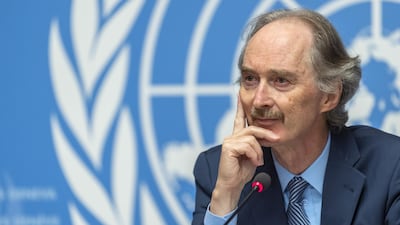Today marks the launch of Syria's constitutional committee, a UN-led peacebuilding initiative that took two years and involved numerous precarious negotiations with four countries – Syria, Russia, Turkey and Iran – to reach this point. As the 150 people tasked with rewriting the post-war constitution hold their first meeting in the Swiss city of Geneva today, they carry with them the hopes of millions of Syrians who have suffered for nearly a decade since war broke out in 2011. However, the initiative carries with it many pitfalls and potential minefields, not to mention the flaws in its very set-up. Since the initiative first began, the path to establish a committee has been fraught with difficulties as all the parties involved struggled to agree, primarily on whom to include.
One-third of the committee members represent the regime. They were chosen behind closed doors and vetted by Iran, Turkey and Russia, all of which have a vested interest in Syria's future. This means there is no guarantee that the new constitution will reflect the will of the people, nor provide for the concerns of those who first protested against the totalitarianism of the Assad regime. Nor do its members represent all of Syria’s many communities and their interests. For instance, there are few Kurds playing a role or having a voice on the committee while no members speak for the People’s Protection Units, or YPG, which played a pivotal role in defeating ISIS.
Opposition factions have also pointed out that the Assad regime has effectively been given international legitimacy by the fact it has ample representation in the committee. In fact, the long-awaited announcement of the committee's formation was made during a visit to Damascus by Geir Pedersen, the UN special envoy for Syria, where he held talks with Walid Al Moualem, the foreign minister. No peacebuilding initiative can hope to have a long-lasting impact without taking into account all sides involved in the conflict and arriving at a solution that is acceptable to all. Otherwise, any attempts to negotiate a political resolution are doomed.
The truth is that Bashar Al Assad's forces are an inevitable reality on the ground and have made significant territorial gains over the past few years. In fact, following the US announcement of a withdrawal of its troops and the subsequent Turkish invasion of northern Syria earlier this month, the Kurdish-led Syrian Democratic Forces were forced to turn to the regime for help, leaving Mr Al Assad in control of nearly all of the country.
Despite its flaws, the launch of the process for a new constitution is a cautious step forward. The situation in Syria continues to be bleak, with millions still displaced or too terrified to return, despite the demise of the ISIS caliphate, whose last bastion of Baghouz was decimated in March. These constitutional efforts give an important platform to the dispossessed and disenfranchised: the Syrian opposition. The committee is one of the few remaining avenues where the regime does not have total control and allows Syrians from different background and affiliations to air their grievances. The process is also the first step towards finding a political solution to end a conflict that has left more than half a million people dead and half the country's population homeless.
All parties involved must work together and take this initiative seriously so that Syria can finally be peaceful. It is the very least long-suffering Syrians deserve.

